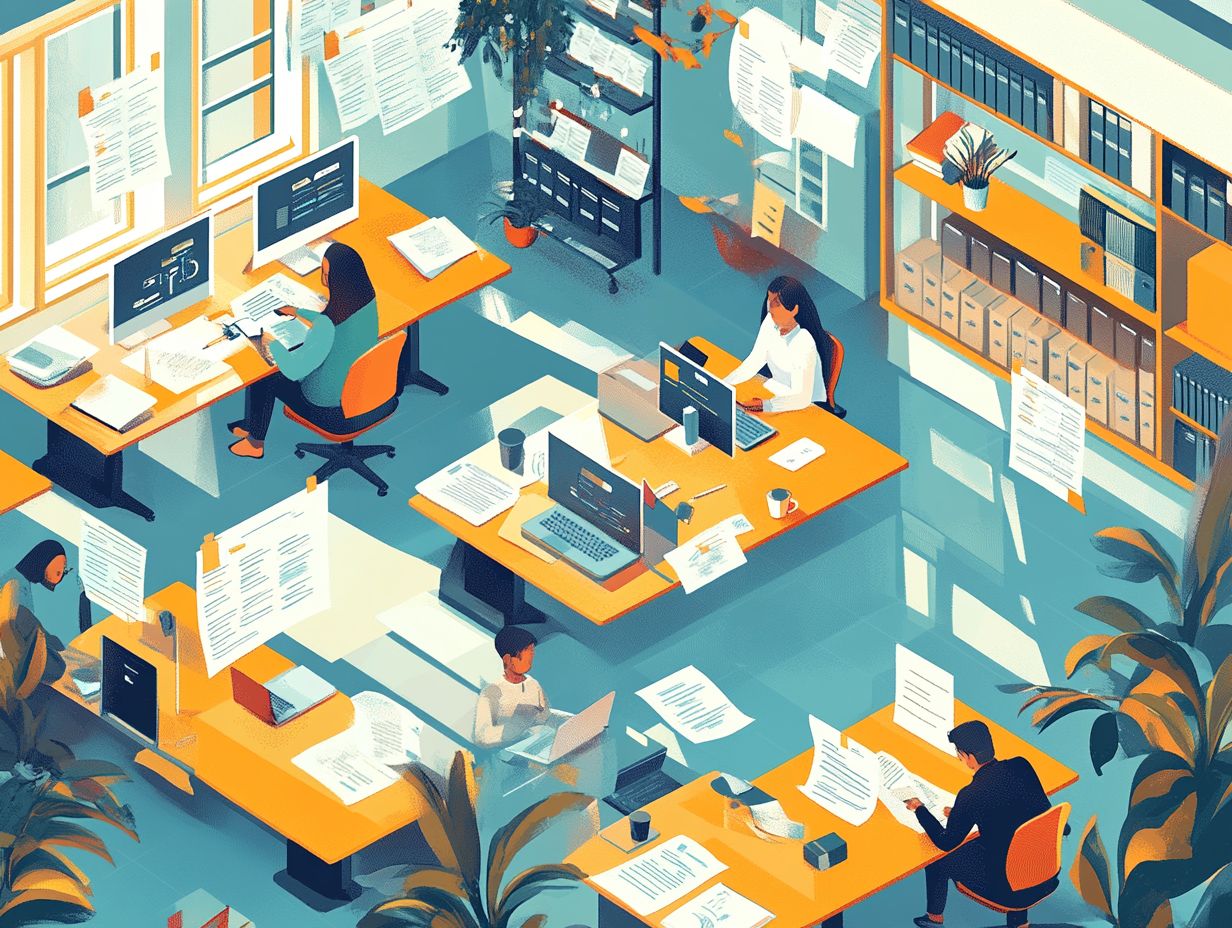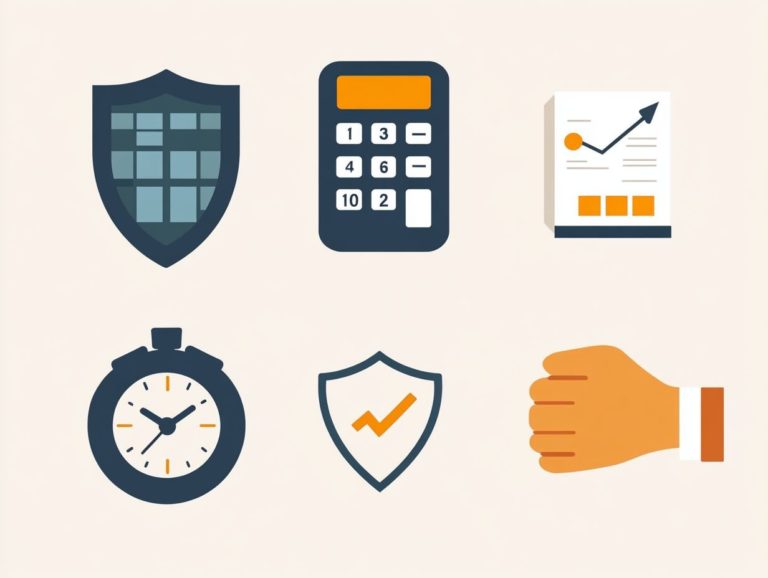5 Common Insurance Policies for Freelancers
Navigating the world of freelancing presents its own unique challenges. One of the most crucial aspects to grasp is the importance of insurance.
Whether you find yourself in the role of a graphic designer, writer, or consultant, having the right coverage can shield you from unexpected challenges. This protection helps secure your financial wellbeing and grants you priceless peace of mind.
This article covers five essential insurance policies you should consider. It also examines the risks of not having coverage and answers common questions about health, disability, and liability.
By the end, you ll know exactly how to protect your freelance career and secure your future.
Contents
- Key Takeaways:
- 1. Health Insurance
- 2. Disability Insurance
- 3. Liability Insurance
- 4. Business Property Insurance
- 5. Life Insurance
- What Is Freelance Insurance and Why Is It Important?
- What Are the Risks of Not Having Insurance as a Freelancer?
- How Can a Freelancer Determine Which Insurance Policies They Need?
- What Are the Different Types of Health Insurance for Freelancers?
- How Does Disability Insurance Protect Freelancers?
- What Are the Benefits of Liability Insurance for Freelancers?
- How Can Business Property Insurance Protect a Freelancer’s Assets?
- What Are the Different Types of Life Insurance Available for Freelancers?
- How Can a Freelancer Afford Insurance on a Tight Budget?
- What Are the Common Myths About Freelance Insurance?
- Frequently Asked Questions
- What 5 insurance policies should freelancers know about?
- Do I really need health insurance as a freelancer?
- What does liability insurance cover for freelancers?
- Why should I consider disability insurance as a freelancer?
- What is included in a business owner s policy for freelancers?
- What does errors and omissions insurance protect against?
Key Takeaways:

- Health insurance is essential for freelancers as it covers medical expenses and protects against unexpected healthcare costs, ensuring your financial stability.
- Disability insurance provides financial support when a freelancer is unable to work due to injury or illness.
- Liability insurance protects freelancers from potential lawsuits and covers any damages or legal fees incurred.
1. Health Insurance
Health insurance is essential for freelancers. It enables you to access affordable healthcare options while protecting against unexpected medical expenses that could jeopardize your financial stability and cash flow, especially in the unpredictable gig economy.
For independent workers like you, securing coverage through the Health Insurance Marketplace offers a range of options tailored to diverse needs and budgets. By exploring plans that include essential health benefits such as preventive services, prescription drug coverage, and mental health support you can find a solution that meets your healthcare requirements and grants you peace of mind.
This coverage serves as a safeguard against financial challenges from unforeseen health issues. It allows you to concentrate on advancing your career. A carefully curated health insurance plan can strengthen your long-term financial strategy, ensuring you re prepared for both expected healthcare needs and unexpected medical emergencies.
2. Disability Insurance
Disability insurance is crucial for freelancers. It provides a vital way to protect your income during unexpected periods of injury or illness.
This coverage helps you maintain your livelihood in the face of unforeseen circumstances. There are various types of disability insurance available, including short-term and long-term plans. Short-term policies cover a few months of lost income, while long-term options can extend for several years or even until retirement age. Since self-employed people usually don’t have employer-sponsored benefits, a strong disability insurance plan is particularly important.
Consider this: nearly 25% of those who reach age 20 will experience a disability lasting longer than a year. This statistic highlights the importance of having a solid plan in place.
For example, a freelance graphic designer who suffers a significant injury could lose more than half their annual income without adequate coverage. This underscores the necessity of such protection.
3. Liability Insurance
Liability insurance is essential for freelancers, providing vital protection against professional and general liability claims that could arise from personal injury incidents or service delivery errors. This coverage safeguards your assets and ensures your business can operate smoothly.
In today’s interconnected marketplace, risks associated with inadequate protection are both significant and intimidating. Professional liability insurance acts as your safety net against claims related to negligence, misrepresentation, or subpar work outcomes. Commercial general liability covers any injuries or damages that may occur during your business activities.
Without this coverage, you risk facing substantial financial burdens, potentially jeopardizing your hard-earned savings due to lawsuits or claims. Don’t wait evaluate your specific risks and seek out the most appropriate coverage options.
By researching various policies, consulting with insurance professionals like financial advisors, and comparing quotes, you can make an informed decision that grants you peace of mind and stability as you navigate your entrepreneurial journey.
4. Business Property Insurance
Business property insurance is a crucial safeguard for freelancers, ensuring that your workspace is protected against risks like theft, damage, or loss. This coverage allows you to shield yourself and your assets in an unpredictable work environment.
This type of insurance is particularly important if you’re working from home or a rented space, where your personal and professional items often blend. The financial consequences can be significant if your essential equipment like computers or specialized tools is suddenly lost or damaged. With business property insurance, you can maintain continuity in your operations, as it provides the necessary coverage to recover losses.
In an industry full of uncertainties, having this safety net not only protects your physical assets but also contributes to your long-term financial stability. This way, you can focus more on your creative pursuits and worry less about potential financial setbacks.
5. Life Insurance

Life insurance is a key component of financial planning for freelancers, providing a safety net for your dependents in the unfortunate event of your untimely death. This protection is especially important given the unique financial responsibilities you navigate in your freelance career.
With options like term life and whole life insurance, you can tailor coverage to fit your specific situation and future aspirations. Term life insurance typically offers coverage for a set period, making it a smart, cost-effective choice to ensure your family is protected during your most lucrative years. Conversely, whole life insurance provides lifelong coverage while also acting as a savings vehicle, accumulating cash value over time.
By carefully assessing your individual needs considering factors such as income stability, debt obligations, and family size you can make informed decisions that not only safeguard your loved ones but also enhance your overall financial well-being.
What Is Freelance Insurance and Why Is It Important?
Freelance insurance comprises a variety of policies crafted to shield freelancers from the many risks of freelance work. This includes health, disability, liability, and property insurance, all of which are vital for maintaining financial stability. With the right coverage, you can continue your work without the looming stress of potential claims or losses.
In the modern gig economy, where many rely on short-term contracts or freelance opportunities, having robust insurance coverage can profoundly influence your ability to navigate uncertainties. With a plethora of options, such as professional liability insurance or business interruption coverage, it’s essential to carefully assess your unique needs. Being aware of common mistakes in freelancer insurance selection can also guide your decision-making process. Engaging a financial advisor, like Peter Bourg, can help you navigate this intricate landscape, ensuring you select the right policies to protect your livelihood.
For those just starting their freelance journey, here are some actionable steps to ensure you have understanding freelancer insurance options for adequate coverage:
- Review your current income streams.
- Pinpoint potential risks you might face.
- Explore insurance options specifically tailored for freelancers to ensure comprehensive protection.
What Are the Risks of Not Having Insurance as a Freelancer?
Freelancers who skip insurance face significant risks. You may experience financial instability from claims related to personal injury, property damage, or medical emergencies. These situations can quickly drain your savings and disrupt your livelihood.
Imagine if a freelance graphic designer trips and gets injured at a client s studio. Without insurance, those medical bills could escalate rapidly, leaving your financial security hanging by a thread.
Or think about this: if you inadvertently damage a client’s property while working on-site, you could be on the hook for repair costs that far exceed what you have saved. These scenarios highlight the precarious position freelancers can find themselves in when they operate without adequate coverage. To better understand the risks, consider debunking common misconceptions with the top 7 insurance myths for freelancers.
Having the right insurance serves as a vital safety net, safeguarding you against unforeseen events. This allows you to concentrate on your craft instead of fretting over potential financial disaster. For tips on how to choose the right insurance as a freelancer, act now to protect yourself and ensure ongoing success.
How Can a Freelancer Determine Which Insurance Policies They Need?
Determining the insurance policies you need as a freelancer requires a careful evaluation of your unique risks, financial responsibilities, and personal circumstances. This process often benefits from the insight of a financial advisor, who can help you navigate the vast array of coverage options available.
Start by identifying your potential vulnerabilities. Consider risks such as health issues, equipment loss, or liability claims that could arise in the course of your work. Additionally, 5 reasons freelancers should get life insurance highlight the importance of being prepared. Assessing your personal finances is equally crucial; you want to ensure you obtain adequate coverage without straining your budget.
When selecting the right insurance programs, take the time to compare different providers, read reviews, and scrutinize policy terms. It’s a smart move to seek recommendations from peers in your field. Partnering with a financial advisor can offer you tailored advice, ensuring the policies you choose align seamlessly with both your current needs and your future goals.
What Are the Different Types of Health Insurance for Freelancers?
Freelancers have access to a variety of health insurance options, including individual plans from the Health Insurance Marketplace. These plans can provide affordable healthcare tailored to your unique needs, ensuring comprehensive coverage even in a fluctuating income environment.
Navigating this marketplace may seem intimidating at first, but it offers a range of choices that cater to different budgets and requirements. You can opt for catastrophic plans, which offer low premiums but high deductibles, or choose more comprehensive options that cover a wider array of services.
When evaluating a plan, it’s essential to closely examine the premiums, deductibles, and out-of-pocket maximums to find a balance that aligns with your financial situation. Understanding the network of healthcare providers and checking for any necessary medications will also play a crucial role in making informed decisions.
Make sure you’re covered today to secure your freelance future!
How Does Disability Insurance Protect Freelancers?

Disability insurance provides you with essential protection as a freelancer. It offers income replacement when illness or injury prevents you from working.
This support empowers you to manage your finances confidently, even in tough situations. It helps you meet your financial responsibilities and maintain your lifestyle during challenging times.
For those without the security of a traditional paycheck, such as graphic designers or consultants, this safety net becomes especially vital. Consider a freelance writer who suddenly encounters a serious medical condition. This condition makes typing or attending meetings impossible.
With disability insurance in place, they can receive a percentage of their income during recovery, easing the burden of unpaid bills. This allows them to focus on their health.
The peace of mind that comes from knowing your financial obligations can still be met is truly invaluable. This makes 10 essential insurance types for freelancers an important consideration for anyone navigating the independent work landscape.
What Are the Benefits of Liability Insurance for Freelancers?
Liability insurance offers you a multitude of advantages, particularly in shielding against legal claims that can arise from your work. These claims can spiral into expensive legal battles and disrupt your financial stability. This security ensures you can focus on your work with peace of mind.
Liability insurance also protects you from unforeseen legal expenses, playing a vital role in your overall risk management strategy. For example, imagine a graphic designer who accidentally uses copyrighted material in a client project. This mistake lands them in a lawsuit over intellectual property infringement.
In such a case, liability insurance would cover the legal fees and any settlements, sparing you from significant financial strain. Similarly, as a consultant, you might face claims of negligence if a proposed strategy doesn t pan out, putting both your reputation and finances at risk.
With liability insurance in your corner, you gain essential support in these situations, enabling you to work confidently without being overly concerned about potential pitfalls.
How Can Business Property Insurance Protect a Freelancer’s Assets?
Business property insurance acts as your safety net, protecting your commercial property from risks like theft and damage. This means you can safeguard your assets against unexpected financial losses.
This type of insurance goes beyond just covering physical damage to your equipment and inventory; it can also compensate for lost income due to business interruptions. You have the flexibility to tailor your policy to include coverage for specific tools or technology crucial to your work, ensuring it meets your unique needs.
For example, if you’re a graphic designer reliant on high-end computers, you can easily add coverage for equipment malfunctions to your policy. A freelance photographer may find value in a policy that covers both her camera gear and income loss from canceled gigs, giving her the peace of mind that her business could navigate unexpected challenges. Additionally, it’s important for freelancers to consider their long-term financial security by exploring options like the 5 best retirement plans for freelancers.
What Are the Different Types of Life Insurance Available for Freelancers?
Freelancers have a variety of life insurance options at their disposal, including term and whole life policies. Each is meticulously designed to address distinct financial responsibilities and provide security for loved ones.
Understanding the nuances of each choice is essential. Term life insurance usually offers lower premiums and coverage for a defined period, making it an appealing option for those seeking cost-effective protection.
On the other hand, whole life insurance comes with a cash value component that grows over time, offering both a death benefit and a potential investment opportunity.
To identify the most fitting policy, freelancers should carefully evaluate their individual financial goals, consider the needs of their dependents, and reflect on their long-term plans. This personalized approach guarantees that the chosen life insurance meets immediate obligations and harmonizes with future aspirations.
Explore your insurance options today to secure your freelance career!
How Can a Freelancer Afford Insurance on a Tight Budget?
Navigating insurance affordability on a tight budget can be daunting for freelancers. Fear not numerous strategies can help you secure essential coverage without straining your finances!
One effective approach is to delve into bundled insurance policies, which cover multiple needs like health, dental, and vision at more favorable rates. Actively seek out any discounts or subsidies that apply to your income level; these can significantly reduce your overall costs. Remember, smart freelancers explore every option available, including the top 5 insurance plans for freelancers!
Joining professional organizations can be advantageous as they often provide access to group health plans with competitive premiums. Invest some time in researching and comparing your options to achieve significant savings and obtain tailored care that aligns perfectly with your health needs. For freelancers, exploring resources like the Freelancers’ Guide to Health Insurance can be particularly helpful, along with organizations like The National Association for the Self-Employed and Freelancer s Union.
What Are the Common Myths About Freelance Insurance?

Numerous myths surround freelance insurance, often leading self-employed individuals to misunderstand its necessity and benefits. This coverage is vital for ensuring long-term financial stability and effective risk management. For example, you might think that working from home exempts you from needing insurance, but that couldn’t be further from the truth! Freelancers face various liabilities like client disputes or equipment theft that could financially cripple your business without the right protection. Protect yourself by understanding the risks involved.
Recent studies reveal that freelancers without coverage are 60% more likely to suffer significant financial losses after unforeseen events. Recognizing that insurance is not just an expense but an essential investment in safeguarding your livelihood can enable you to make smarter choices for your future. This is especially relevant in the gig economy, where many freelancers operate without adequate protection. To learn more about how to save on insurance as a freelancer, check out this helpful guide on saving on insurance.
Frequently Asked Questions
What 5 insurance policies should freelancers know about?
The five common insurance policies for freelancers are health insurance, liability insurance, disability insurance, business insurance, and errors and omissions insurance. Understanding these policies for freelancers is crucial for navigating your professional landscape.
Do I really need health insurance as a freelancer?
Yes, health insurance is vital for freelancers as it provides coverage for medical expenses and protects against unexpected health issues or accidents. It s not just an option; freelancers must prioritize their financial responsibilities when selecting coverage.
What does liability insurance cover for freelancers?
Liability insurance for freelancers covers legal costs and expenses if a client sues for damages or injury caused by your work or advice. This type of professional liability insurance is essential for anyone providing professional services.
Why should I consider disability insurance as a freelancer?
Disability insurance provides income protection if you’re unable to work due to an injury or illness, allowing you to continue supporting yourself and your business. It s a crucial component of a freelancer s financial plan.
What is included in a business owner s policy for freelancers?
A business owner s policy typically includes general liability insurance and property insurance, providing coverage for both your business and personal assets.
What does errors and omissions insurance protect against?
Errors and omissions insurance, also known as professional liability insurance, protects freelancers from claims of negligence, mistakes, or failures in their work or services.
Start exploring your options today and protect your future!






